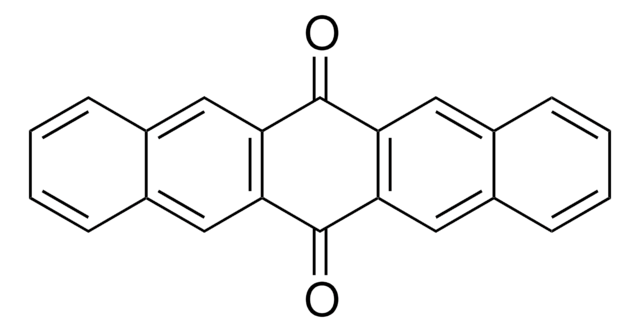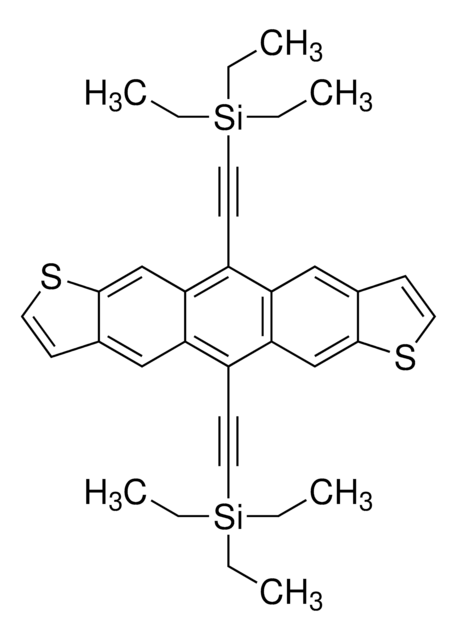716006
6,13-Bis(triisopropylsilylethynyl)pentacene
≥99% (HPLC)
Synonyme(s) :
TIPS pentacene
About This Item
Produits recommandés
Niveau de qualité
Pureté
≥99% (HPLC)
Forme
solid
Pf
276 °C
Solubilité
acetone: soluble 0.16 wt. % at 23 °C(lit.)
anisole: soluble 2.03 wt. % at 23 °C(lit.)
n-butylbenzene: soluble 3.43 wt. % at 23 °C(lit.)
toluene: soluble 6.57 wt. % at 23 °C(lit.)
Densité
1.104 g/cm3 at 25 °C
Chaîne SMILES
CC(C)[Si](C#Cc1c2cc3ccccc3cc2c(C#C[Si](C(C)C)(C(C)C)C(C)C)c4cc5ccccc5cc14)(C(C)C)C(C)C
InChI
1S/C44H54Si2/c1-29(2)45(30(3)4,31(5)6)23-21-39-41-25-35-17-13-15-19-37(35)27-43(41)40(22-24-46(32(7)8,33(9)10)34(11)12)44-28-38-20-16-14-18-36(38)26-42(39)44/h13-20,25-34H,1-12H3
Clé InChI
FMZQNTNMBORAJM-UHFFFAOYSA-N
Description générale
Application
Informations légales
Mention d'avertissement
Warning
Mentions de danger
Conseils de prudence
Classification des risques
Eye Irrit. 2 - Skin Irrit. 2 - STOT SE 3
Organes cibles
Respiratory system
Code de la classe de stockage
11 - Combustible Solids
Classe de danger pour l'eau (WGK)
WGK 3
Point d'éclair (°F)
Not applicable
Point d'éclair (°C)
Not applicable
Faites votre choix parmi les versions les plus récentes :
Déjà en possession de ce produit ?
Retrouvez la documentation relative aux produits que vous avez récemment achetés dans la Bibliothèque de documents.
Articles
Highly reducing or oxidizing species enhance organic semiconductor conductivity by reducing charge-carrier injection barriers.
Highly reducing or oxidizing species enhance organic semiconductor conductivity by reducing charge-carrier injection barriers.
Highly reducing or oxidizing species enhance organic semiconductor conductivity by reducing charge-carrier injection barriers.
Highly reducing or oxidizing species enhance organic semiconductor conductivity by reducing charge-carrier injection barriers.
Notre équipe de scientifiques dispose d'une expérience dans tous les secteurs de la recherche, notamment en sciences de la vie, science des matériaux, synthèse chimique, chromatographie, analyse et dans de nombreux autres domaines..
Contacter notre Service technique




![Benz[b]anthracene 98%](/deepweb/assets/sigmaaldrich/product/structures/197/885/3a015625-5e09-4f15-8b17-4cc285304fc7/640/3a015625-5e09-4f15-8b17-4cc285304fc7.png)




